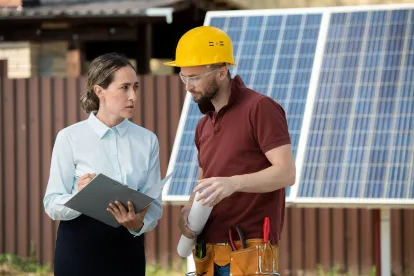This is the first in a series of articles summarizing key topics discussed at Ward and Smith's 2021 Construction Conversations Webinar.
Members of Ward and Smith's Government Relations and Labor and Employment teams recently discussed the rapidly changing dynamics of state/federal issues and employment law regulations pertaining to the construction industry.
"If you think of government relations/government contracting, it's really about resiliency and being able to adapt over time because you have political hazards, shocks, and stresses from budget-related issues," said Government Relations Practice Group Leader Jamie Norment, who helps clients solve problems and develop creative solutions through legislative and policy-making systems at the local, state and federal levels.
"At the same time, though, there is a certain amount of stability that I think will allow companies that plan ahead to succeed without having to compromise their long-term prospects for development," Norment said. The stability comes from the fact that the funding stream will remain, at least in the foreseeable future, and large construction projects that are underway will need multi-year funding.
Though he indicated that it is impossible to predict the future, especially when it comes to politicians, Norment believes large federal spending packages are on the way, including:
-
A $3.5 trillion pandemic recovery social spending bill;
-
The record-setting $1.2 trillion bipartisan infrastructure bill, which includes spending on bridges, roads, water, and sewer projects; and,
-
Typical spending from the annual Federal Budget. For instance, we expect over $200 million in new construction for FY22 through the normal military appropriation process.
The infrastructure spending bill is caught up in the social spending bill, which has been unable to garner broad support. "The bills are not linked in law, but they are being linked politically, so the problem is you aren't going to get one until you get the other," Norment explained.
What Norment expects to happen is the $3.5 trillion social spending bill will eventually be pared down to $1.75 trillion over the next few weeks. He thinks it will pass in that form, hopefully by Thanksgiving, allowing the infrastructure plan to also pass.
The Federal budget is also still in limbo. Norment says it is important to note that, even if the infrastructure bill is passed, it still has to be authorized in the budget. He expects the Federal budget to pass sometime in February or March through a series of resolutions and appropriations bills.
Implications for North Carolina
"In those bills, you are going to have at least $400 million in new military construction dollars at Ft. Bragg, Camp Lejeune, and Cherry Point," said Norment. "Cherry Point is going to get the most money because they are essentially rebuilding the air base. They are going to get $200 million in new construction and as much as $400 million over the next three years."
North Carolina's budget has been finalized and sent to Governor Roy Cooper for review. Though the version is secret, many expect that it will include spending on:
-
Department of Transportation
-
Schools and universities
-
Flood resiliency, disaster mitigation, and conservation and stormwater infrastructure initiatives
Norment believes the budget will allocate billions for construction projects for state buildings, water and sewer, schools, and universities. He also thinks it will include numerous tax reductions, including lowering state individual income taxes and the corporate income tax.
Construction-Related Policy Matters
Norment detailed some current policy matters related to construction and some potential changes:
-
House Bill 489 State Building Code changes - This one has already become law and covers limitations on local government erosion control programming; re-inspection fees are limited or eliminated; generally developer-friendly.
-
House Bill 783 New State Building Code Permit Technician Certification - This is not yet law but could be in 2022. It deals with a code technician certification program.
-
House Bill 820 - Deals with design/build rules; creates terminology for first-tier subcontractor; licensed contractor; licensed subcontractor and unlicensed subcontractor. Attempts to prevent the abuse of interim lien waivers. This is not a law yet.
-
House Bill 865 - Establishes the use of private inspectors for commercial building inspections instead of city or county employees. The costs would be passed to cities and counties, so it is facing significant opposition and is not currently law.
Looking ahead, Norment says there are a few items of concern to be aware of, including the uncertainty over the Federal budget, when Federal tax increases may occur, confusion over the procurement of Federal money to support local governments, and the upcoming round of elections.
Construction Employer Issues
Emily Massey, a labor and employment attorney with experience helping employers navigate a wide range of issues, kicked off the discussion by stating that, currently, all of the hot topics related to employment law have to do with COVID-19.
"I really wished I could talk about something else, but the reality is these issues just keep changing and becoming more challenging for employers, so I think this is the most important topic," said Massey.
One key update that has been on the news recently is President Biden's COVID-19 action plan. To help construction industry professionals understand what this means for them and their businesses, Massey covered three of the most critical points:
-
Employers with 100 or more employees – Vaccination or weekly testing to be required
Though the final rules are not in place, there is little doubt that they are on the way. The President ordered OSHA to make an emergency temporary standard (ETS) outlining this requirement, but there is little clarity about the details. The ETS will offer guidance and a deadline for employers to comply with this vaccination/weekly testing rule.
-
Federal contractors and subcontractors – Vaccination required by December 8
The guidelines are already in place for this requirement, given President Biden's executive order impacting federal contractors. An important item to note is that all contractors and subcontractors have to be fully vaccinated by December 8, 2021, meaning post the two weeks following the second dose. Also, any employees working remotely on a federal contract or providing support services for a federal contract are covered by this rule.
-
Workers in most healthcare settings – Vaccination to be required
The final rules and regulations are not yet in place for this requirement. This may be applicable to contractors because some healthcare facilities have started to require vendors and contractors to have certain workplace safety protocols in place, such as requiring anyone coming into the hospital to be vaccinated.
Massey indicated that a common question she has received about the vaccine or testing requirement for employers with 100 or more employees is centered on the actual employee count. Will it include part-time employees and employees from affiliated companies? Probably. Another common question is whether this requirement will include people working from home? Massey thinks it's possible, though it would be difficult to enforce. This leads to a broader question: Does OSHA has the jurisdiction to enforce guidelines on remote workers? The simple answer is there's a lot of uncertainty on this issue.
Another question Massey frequently hears is about whether or not lawsuits will be filed over the plan. "Once OSHA releases these regulations, we envision there being lawsuits saying that OSHA doesn't have jurisdiction to enforce these types of rules," Massey said. However, Massey is recommending that her clients with an aggregate of 100 independent contractors, part-time or full-time employees, to start preparing for this requirement.
Navigating Red Tape
She added that one of the most difficult tasks associated with preparing for compliance is administrative. "Whether you choose to require testing or vaccination, either way, it's a lot of administrative work: vaccination cards have to be copied and kept confidential, testing has to be coordinated, the results have to be gathered, and the entire process has to be monitored," Massey explained.
Also, employees have certain rights under Title VII of the Civil Rights Act and the ADA. This makes it possible for them to request accommodations about why they do not have to be vaccinated due to religious beliefs or medical reasons. In that situation, employers would have to go through an interactive process explaining why or why not those requests could be accommodated.
Massey added that COVID-19 has exerted a variety of additional issues on the workplace, such as:
-
Employees hesitant to return to work because of COVID-19 variants
-
Exceptions to workplace safety policies - people may feel as if there isn't enough PPE provided or that the work environment is unsafe
-
Labor shortages - Even something that seems positive, such as a bonus/incentive pay, can impact overtime requirements and have other negative consequences, as some may view it as discriminatory
With a lot of unknowns ahead, it's best for large employers to prepare to comply with federal standards and frequently check for further guidance on these unsettled issues.




 />i
/>i